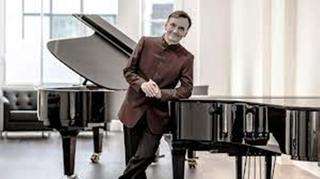|
Back
Of Men and Gauze New York
Isaac Stern Auditorium Carnegie Hall
01/30/2018 - & March 3 (Wells), 7 (Horsham), 8 (Walton-on-Thames), Sheffield (Sheffield), April 28 (Holkham), 29 (Harrogate), May 7 (Newbury), 24 (Abbotsholme), June 1 (Swaledale), 24 (Parçay-Meslay), July 13 (Santa Barbara), 23 (Ottawa), August 31 (Snape Maltings), September 10 (London), 17 (Marlborough), 20 (Pisa), 26 (Mumbai), October 25 (Hilo), 26 (Kamuela), 27 (Honolulu), 29 (Maui), November 8 (Notre Dame), 10 (Kalamazoo), 22 (Paris), 26 (Wilton), December 6 (Miami), 8 (Durham, NC), 2017, January 18 (San Francisco), 23 (Toronto), 26 (Tryon), February 25 (Liège), 26 (Milano), March 1 (Napoli), 19 (Manchester), April 5 (London), 17 (Bratislava), May 5 (Stamford), 23 (Chipping Campden), 25 (Bath), June 9 (Liverpool), 10 (Hertford), 24 (Melbourne), 2018
Claude Debussy: Suite bergamasque: “Clair de lune” – Images (Book II) – Préludes (Book II): “La Terrasse des audiences du clair de lune” – Images (Book I)
Robert Schumann: Fantasy in C Major, Opus 17
Ludwig van Beethoven: Piano Sonata No. 23 in F Minor “Appassionata”, Opus 57
Stephen Hough (Pianist)

S. Hough (© FontantaMusic.org)
On March 25, one-hundred years ago, Claude-Achille Debussy took his last painful cancerous breath. This year, then, as these funerary centenaries go, we will be filled with more Debussy breathlessness. But with pianists like Stephen Hough, we need not regret the absence of a Gieseking or Richter to do the deeds. With Hough playing from early and late Debussy and two miscellany, we could relax (if that be the word) and enjoy the show.
Debussy didn’t monopolize this recital. For reasons that seemed irrational on paper, Mr. Hough added major works by Schumann and Beethoven to the stew. Yet for this kind of program, those contrasts were quite successful. In effect, Mr. Hough was contrasting the world of Men and Gauze.
He started with that most “popular’ Debussy work, Clair de lune, transforming it into a piece of unearthly beauty. Here, as in the rest of the Debussy, there was no artifice. There were no piano tricks. Nothing came between the audience and the music.
As in the following music, Mr. Hough carried the music with an inherent sense of truth. The deceptive simplicity of Clair de lune commanded effortless attention. For Mr. Hough never reaches for the “effect”. His focus, his almost faultless technique, his intelligent phrasing comes from a very deep place, not just his hands.
The following second book of Images needed no measure-by-measure account. These were accounts of gauze and shadows, hazes and aromas. The “Moon descending” was not the “image” of the moon. It was, at most, a faded 1890’s photograph, an effect, made with liberal pedaling and amorphous clouding. The “Goldfish” were not fish at all, they were again pictures of light, or iridescence and nimbleness.
The pianists in the audience were following each note. Others probably dreamed through the phrasing and measures. And both were right.
In the second half, Mr. Hough returned to more Debussy. More Clair de lune from the moonstruck pen from the Preludes, followed by more Images highlighted by an intense, brilliant display of sudden melodies in “Mouvement” erupting like lava from such controlled expertise.
Perhaps Mr. Hough could have devoted an entire program to Debussy (as perhaps he might this year), yet he abruptly veered from French metaphysical poetry to Prussian straightforward concertizing. Whether by accident or not, Mr. Hough left the stage, the lights filled Carnegie Hall then dimmed, and Mr. Hough came back with a hair-lifting sforzando opening in Schumann’s C Major Fantasy.
The result between the two composers nor jarring (and certainly not dis-concerting!), but it was jolting. No longer were we meandering through fields of Mallarme-inspired flowers. We were in the German Romantic world with a Valentine for the composer’s wife, a sardonic march, through an ending both passionate and dignified.
The only weakness I felt was that, the suspenseful caesura between the march and the lento sostenuto arpeggios was not suspenseful at all. Was it the coughing from the audience? Or somehow a lack of tension on Mr. Hough’s part. At any rate, it was a minor diminishment from this grand and powerful performance.
The relationship between Debussy, Schumann and Beethoven was not apparent. But historically, the last two were adjoined. Schumann’s Fantasy was a single movement, until Franz Liszt called for money to erect a statue of Beethoven. The statue was never built, but the extra money given by Schumann for the last two movements of the Fantasy gave us a marvelous gift.
As expected, Mr. Hough gave us a super-charged–but always disciplined–Beethoven Appassionata. Mr. Hough called it “one of the most incendiary works ever written” and he played it with all the necessary fire. Did he drop a few notes in that final coda? Well, Mr. Hough happens to be human. And when Beethoven specified Presto for those measures, Stephen Hough added all the presto magic to Beethoven’s creation.
Two encores: one an elegant Chopin C-Sharp Minor Waltz. The first encore, though, with its echoes of Schumann’s Symphonic Etudes, was new to me. This was, I learned, the fifth of the “posthumous” etudes which had been omitted by Clara and discovered after his death. A beautiful piece which, one hopes, will be appended to Mr. Hough’s next performance of the work.
Harry Rolnick
|